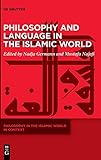Philosophy in the Islamic World in Context. Volume 2, Philosophy and Language in the Islamic World / ed. by Nadja Germann, Mostafa Najafi.
Material type: TextSeries: Philosophy in the Islamic World in Context ; Volume 2Publisher: Berlin ; Boston : De Gruyter, [2020]Copyright date: ©2021Description: 1 online resource (XIV, 343 p.)Content type:
TextSeries: Philosophy in the Islamic World in Context ; Volume 2Publisher: Berlin ; Boston : De Gruyter, [2020]Copyright date: ©2021Description: 1 online resource (XIV, 343 p.)Content type: - 9783110552171
- 9783110552232
- 9783110552409
- 401 23
- P107 .P55 2021
- online - DeGruyter
- Issued also in print.
| Item type | Current library | Call number | URL | Status | Notes | Barcode | |
|---|---|---|---|---|---|---|---|
 eBook
eBook
|
Biblioteca "Angelicum" Pont. Univ. S.Tommaso d'Aquino Nuvola online | online - DeGruyter (Browse shelf(Opens below)) | Online access | Not for loan (Accesso limitato) | Accesso per gli utenti autorizzati / Access for authorized users | (dgr)9783110552409 |
Frontmatter -- Preface -- Contents -- Cognisable Content: The Work of the Maʿnā in Early Muʿtazilī Theory -- The Voie Diffuse and Reconstruction: The De Audibilibus and Sībawayhi’s Account of Voicing -- The Causes of Grammar: Ibn Jinnī on the Nature of Language -- Notes around Ambiguity: Ibn Sīnā’s Logic, ʿAbd al-Qāhir al-Jurjānī’s Poetics, Rāghib’s Two-Meanings-at-One-Time, and the Figures of Ibhām, Istikhdām, and Tawriya -- The Reception of Pointers 1.6 in Thirteenth- Century Logic: On the Expression’s Signification of Meaning -- Reason and Revelation in Fakhr al-Dīn al-Rāzī and the Ashʿarī Tradition -- Informative and Performative Theories of Divine Speech in Classical Islamic Legal Theory -- Understanding Divine Intention: “Conversational Maxims” and the Legal Theory of Muḥammad ibn al-Ḥasan al-Ṭūsī (d. 1067) -- After Adam: Ibn ʿAqīl on Language Origin, Change, and Expansion -- Reclassification of Linguistic Meaning: An Integrated Approach -- Bibliography -- Index of Names -- Index of Subject
restricted access online access with authorization star
http://purl.org/coar/access_right/c_16ec
What is language? How did it originate and how does it work? What is its relation to thought and, beyond thought, to reality? Questions like these have been at the center of lively debate ever since the rise of scholarly activities in the Islamic world during the 8th/9th century. However, in contrast to contemporary philosophy, they were not tackled by scholars adhering to only one specific discipline. Rather, they were addressed across multiple fields and domains, no less by linguists, legal theorists, and theologians than by Aristotelian philosophers. In response to the different challenges faced by these disciplines, highly sophisticated and more specialized areas emerged, comparable to what nowadays would be referred to as semantics, pragmatics, and hermeneutics, to name but a few – fields of research that are pursued to this day and still flourish in some of the traditional schools. Philosophy of language, thus, has been a major theme throughout Islamic intellectual culture in general; a theme which, probably due to its trans-disciplinary nature, has largely been neglected by modern research. This book brings together for the first time experts from the various fields involved, in order to explore the riches of this tradition and make them accessible to a broader public interested both in philosophy and the history of ideas more generally.
Issued also in print.
Mode of access: Internet via World Wide Web.
In English.
Description based on online resource; title from PDF title page (publisher's Web site, viewed 01. Dez 2022)


